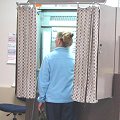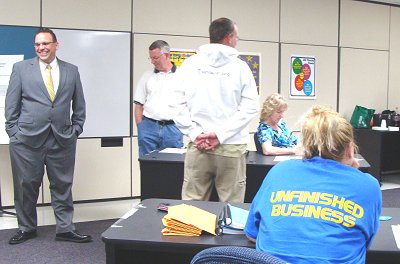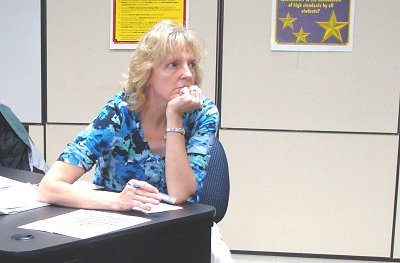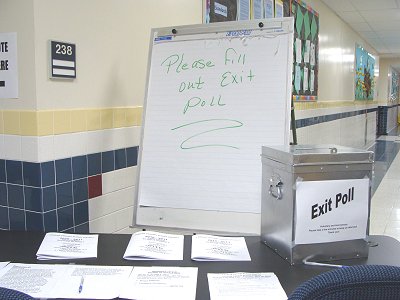- By Dan Veaner
- News
 Print
Print  After a long day at the polls the votes were tallied, and Lansing's voters had approved a $24,377,906 budget 552 to 246. The voters also approved the purchase of two 66-passenger school busses and a Suburban van 520 to 264, costing up to $275,000. Additionally two school board seats were filled with incumbent David Dittman receiving 543 votes and Christine Iacobucci receiving 472 votes.
After a long day at the polls the votes were tallied, and Lansing's voters had approved a $24,377,906 budget 552 to 246. The voters also approved the purchase of two 66-passenger school busses and a Suburban van 520 to 264, costing up to $275,000. Additionally two school board seats were filled with incumbent David Dittman receiving 543 votes and Christine Iacobucci receiving 472 votes."We are excited that our trust in the community for their intelligence and awareness about what's going on is being returned to us in believing that we are presenting them with something that's fair, and something that we truly need," said Superintendent Stephen Grimm after the votes were counted. "We're excited about the confidence that provides us."

Superintendent Stephen Grimm (left) and school board members
after the vote
With only two candidates for two board seats the election result was predictable. But with taxes going up to fund a budget that already represents significant cuts, the outcome was less sure. While the final budget is not that much higher than the state mandated contingency budget, voters were split on whether the cuts were too much or not enough. Dittman advocated cutting more on several occasions, saying that more cuts would put the district on a sounder financial footing to deal with projected cuts in state aid that will no longer be buffered by federal stimulus money.
The district faced a $1.3 million budget gap exacerbated by significant cuts in state school aid that are anticipated to continue for the foreseeable future, as well as a drastic turnaround in a Payment In Lieu Of Taxes (PILOT) agreement with Lansing's biggest taxpayer, AES Cayuga, a coal-based electricity generating plant at the northwest boundary of the town. Cuts include the equivalent of 5.25 faculty positions 9 support staff positions, and the Assistant Principal/Athletic Director position, among others. Some of those positions will be filled by BOCES employees, whose salaries are more aidable, saving the district money.

School Board President Anne Drake awaits the count
Despite the cuts, the budget is rising by $433,591, a 1.81% increase. The levy (the part of the budget raised through taxes) comes to $13,364,831, which was estimated to raise the tax rate by almost 5%. That may be less because of increased overall value of property in the district. The final tax rate is determined later in the summer -- the vote is specifically to authorize expenditures for next budget year. Estimates are that the tax rate will be $18.48 per $1000 of assessed value, up from 17.60 last year.
Grimm had advocated spending more reserve money next year to buy time to figure out how to deliver the high quality education Lansing is known for more economically. That is the compromise that was reached, with difficult cuts this year and the promise to figure out how to spend less over the coming year.
"I'm extremely worried about next year," said School Board President Anne Drake. "We cut to the bare bones this year. I thank everyone for their support, and for their faith, and for turning out."
Grimm is already thinking about next year. Many credit his policy of transparent and inclusive decision-making for convincing Lansing voters to pay an additional estimated $88 per $1000 of property value. In return he has pledged to find less costly ways of delivering a high quality education. An exit poll at yesterday's voting place gathered information about what voters are thinking and what influenced their votes.

"We have always said we want to know what the public is thinking and feeling," Grimm said. "We try to do that proactively while we're developing the budget. We have an exit poll because we want to know, pass or fail, what people are thinking because now we can use that information to help inform us as we begin to plan for next year."
Ithaca voters also approved their $100,779,392 budget 2,222 to 979. Voters also approved propositions to establish a capital reserve fund and to use capital funds for maintenance and bus purchases. The preliminary vote count for school board members was Rob Ainslie 1991, Judy Maxwell 1873, Brad Grainger 1616, Tom Clavel 1305, Allen Lambert 1056, and Jonathan Russell-Anelli 901.
----
v6i19



